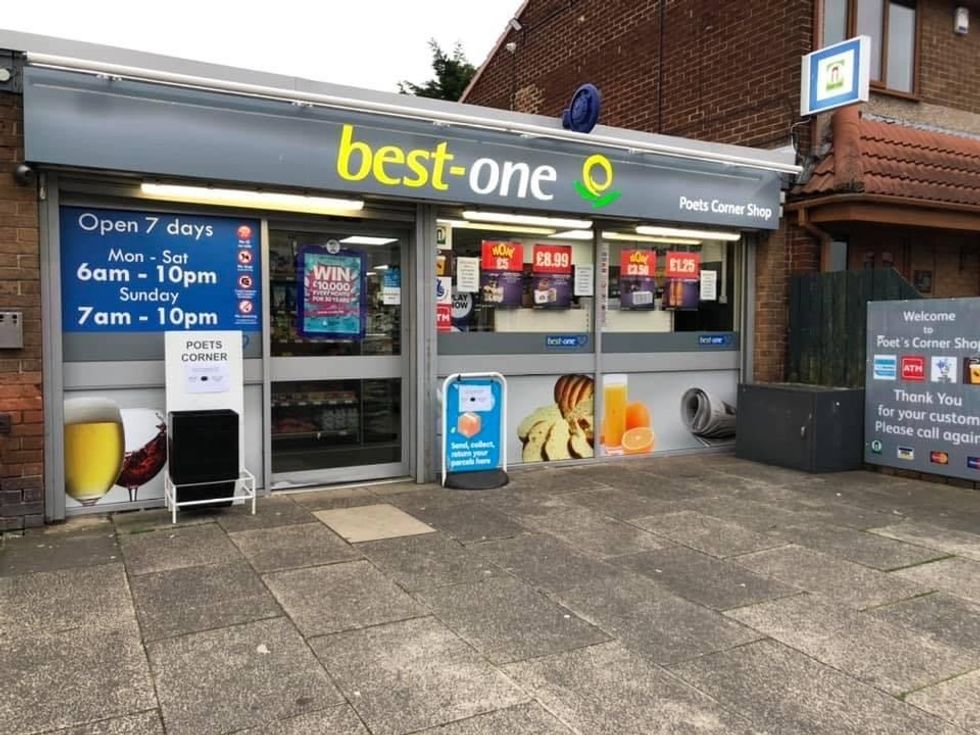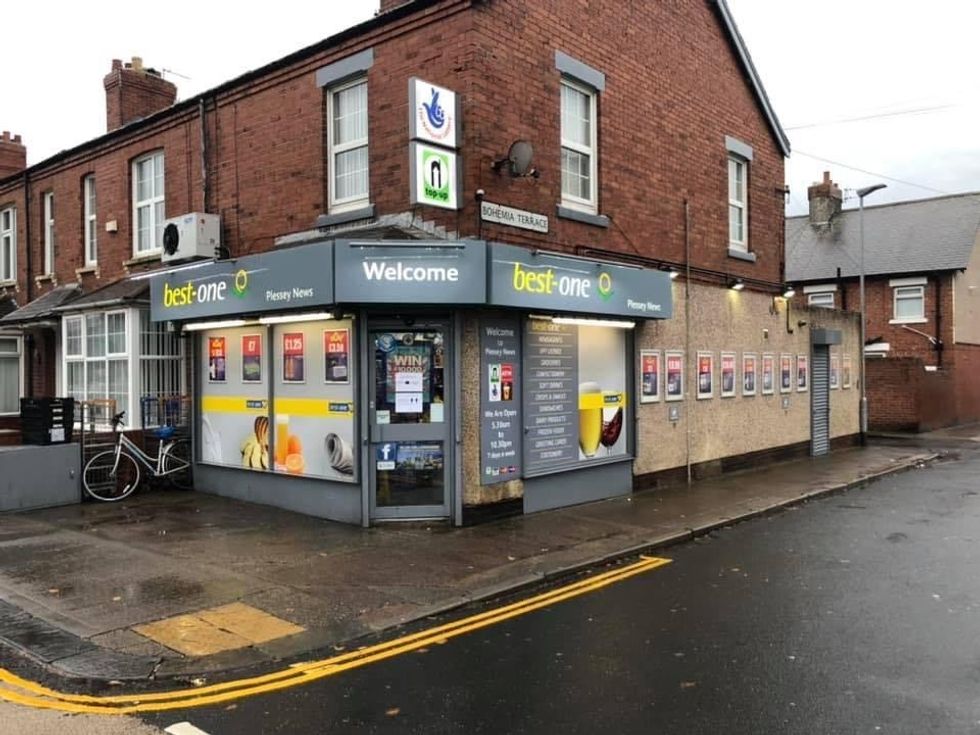“If you give good to the world, the good will come back to you.”
This is what Shad Saleem, who runs two stores and a fish and chip shop in Blyth, firmly believes in. His belief reflects in his actions and defines him in his community. So, when the news of him winning the Spirit of the Community Award at the Asian Trader Awards in 2019 reached his customers, there has not been much of a chance for surprise. Nonetheless, it went down well with the shoppers.
“A lot of people in the community know that I do a lot for the community. [The award] was received very well,” Shad says.
Community work, especially charity, is a passion for this retailer, who counts helping people who are less fortunate as his mission. Shad admits that this might seem bit odd for someone running a retail business in a heavily competitive area, but he is sure of himself.
“I am a very open-handed retailer, so few may think I’m crazy, but that’s the way I am,” he says. “I believe wealth does not decrease by giving to charity. I believe the more you give, the more will come back.”
The success of his two stores, best-one Poets Corner and best-one Plessey News, in Blyth which is inundated with retail shops - the locality has Aldi, Lidl, Asda and many convenience stores - in itself can vouch for the practicality of this philosophy.
“One way we’ve retained footfall is through our support of the community – we support local people, and in turn, they support us back. We face a lot of retailer competition but because we are at the heart of the community customers choose to shop with us,” he says.
The positive effects of his involvement with community - Shad says he never said no to any community support asked of him in the last 20 years – don’t stop there. While the local stores witnessed increased violence and abuse against shop workers during the pandemic lockdowns, his two shops never had any such incidents.
“People have been reasonable and respecting of what we have done. We never had any problems. I think, because of the time and effort I give to community, that also prompts people to give respect to my team members as well,” he says.
Shad finds people are taking the pandemic rules – like mandatory face masks when shopping at stores - a lot more serious than the early days. “In my community people are dealing it quite well. They have been good with my staff as well,” he says.
As the COVID-19 pandemic has started to grip the country last year, Shad has taken proactive measures in response, such as making their elderly shoppers aware that the shops would deliver to them if they are isolating or not able to come to shop, in addition to following whatever measures recommended.
However, his most thoughtful gesture went to his team members, who all received a pay rise.
“All my staff members are over and above minimum wage. I knew that my team members are doing a great job. Within the first week of pandemic started, going back to last February, I increased all my staff’s pay,” he says.
Six months later, he gave all of them £50 as a treat, as a ‘thank you’ for their hard work through the pandemic.
He regularly acknowledges his staff in person and on WhatsApp groups as well. He has also brought the closing time of the shops forward to 10pm, from 10.30 pm, to ease the pressure on them. “It was basically my appreciation towards my staff members who have worked tirelessly,” he says.
While all these measures again reflect his generous self, they also greatly contribute to one his major points of difference, customer service.
“The staff I have are all very superb. My team members work across the businesses. Our stores are clean. These things do help in my involvement with the community. These all help our sales,” he explains.
That’s another way of practicing ‘the more you give, the more will come back’ philosophy.

The pandemic has also seen him stepping up his involvement in community in a personal capacity. One of his signature initiatives has been the Breakfast Club at the nearby Malvin’s Close Primary Academy, set up in partnership with the Rotary Club of Blyth, which enabled 30 children to be given a proper breakfast.
With the schools closed, he tried to keep the initiative going, offering free bread though the whole pandemic. “And, we still offer free bread today. Anybody who are feeling difficult, short of anything essentials, like bread etc, please feel free to come in, ask for it, no questions asked,” he says.
He is heavily involved with Rotary Club of Blyth, of which he will become the senior vice president in July this year. The club took a commitment to 50 families for Christmas, which were recommended by the schools as needing extra help.
“We gave everything from fresh produce to toys. This Christmas, for 50 families, over 350 parcels went out. There were potatoes, turkeys, fresh produce, everything to make a quality Christmas dinner,” he says.
In the last year alone, he gave a one-off donation of £10,000 to the Rotary Club. “I do give lot to the club because we know exactly where it’s going and it’s used very well. Nothing used for costs.”
He is also involved with several organisations in Blyth, and acts as a trustee of Blyth Food Bank, which has seen the demand for food parcels massively increasing during the pandemic. He also continued to support Blyth Spartans football club with advertising boards even when no supporters were going into the ground.
“It’s a moral gesture, that we still support the club. It’s a bit extra revenue for the club which it desperately needs,” he says.
His commitment to the community extends to sourcing products from local suppliers. Their eggs are delivered fresh daily from family-run Lintz Hall Eggs, milk and fresh dairy comes from Hanover Dairies, local greengrocer brings fresh, seasonal vegetables, and a local Blyth sandwich lady delivers homemade sandwiches every day.
“People are aware that our sandwiches, eggs, fruit and veg are local. All these things, I think, do make a difference to the business. We do our bit and keep as many as products as we can locally source, what we can squeeze in our shops,” he says.
The shops have also benefitted from the shopper turn to local stores as a result of the pandemic, enjoying almost 50 per cent rise in weekly sales. While his average sales were £22,000-23,000 a week on both shops prior to the pandemic, it shot up to £32,000-33,000 initially, before coming to back to stabilise slightly above his earlier average figures, still an impressive growth.
“We had a very good run for three or four months. Now, I am a couple of thousand pounds above my averages sales at both sites,” he says, adding that increase in the basket spend has also contributed to the “astonishing” sales.
Above all, the great plus for him is the pandemic forcing people to think of convenience stores as the guys who are here for them. “I think convenience sector has emerged very strong. We got a lot of loyalty towards us because of the time we were there in the very difficult times,” he notes.
A second generation retailer, which he observes as “very rare in this day”, the 45-year-old donates thousands of pounds a year, but he sees it as the little grains of sand that make the pleasant land. “When you help in some small way, you might not make difference to the world, but you could make a big difference to that person in particular,” he tells.
Tackling hunger, particularly among the children, is a cause that is close to the heart of this father of three, and the launch of Breakfast Club has been partly stemmed from his personal ambition to ensure that no child in Blyth goes to school hungry.
“You don’t know what’s around the corner and it could be any of us that one day need to ask for help. This is where the basics of just ensuring people are fed and have a roof over their heads is important to me,” he reasons.
As footballer Marcus Rashford campaigned for school food vouchers for vulnerable children during the pandemic, Shad enlisted his fish and chip shop to the cause.
“I also put this on social media, this whole thing about school holidays, that if you need anything - I tagged my fish and chip shop - go get anything. You need some bread, all the shops will give you it,” he said, adding that he sets aside loaves of bread everyday for people who need a little bit of help.
The offer is, in fact, a standing one. Two years ago, he went viral on social media and attracted both national and international media attention when he made this offer to a man he found on CCTV who seemed to be searching inside the chippy's bins for food.
“We put notices on our bins, we put notices on our shop windows, saying the same thing. Nobody needs to go hungry. Nobody needs to resort to our bins for food.”
The note said: “Dear human being, if you are the person going through our bins for your next meal then how about you pop in and I'll give you a bottle of water and a little snack for free, you are worth more than a meal from a bin. We may also be able to direct you to facilities in the town that may help you.”
“That still stands today,” he says. “All in my team know, everybody that works in my business are local staff, they know the people in Blyth. They know anybody who finds things difficult.”
So, Shad’s passionate appeal to all retailers would be to get involved in the community in whatever way they can: “If you can make a difference to someone else’s life, then you should.” Brought into the convenience as a child by his parents, he has accumulated enough experience to tell you that it pays off on many counts.
“You know you don’t need cameras. People talk within the community and people find out what you are all about. People know whether you are genuine. People know whether you are just doing it for the sake of it, or you have the love and passion,” the wise retailer says.
“Have a big heart. Give to community. Give to people who are less fortunate. It does come back. I really believe it does come back.”






















